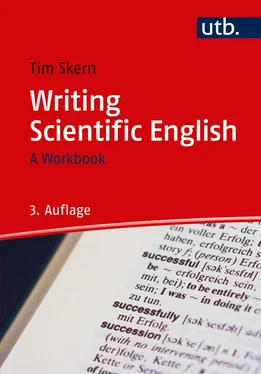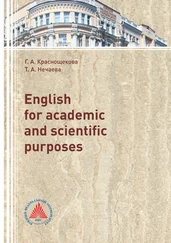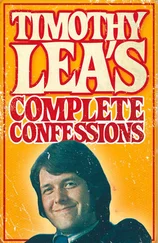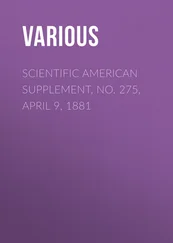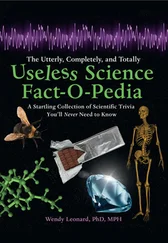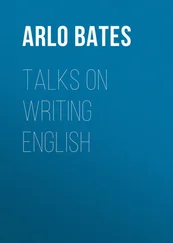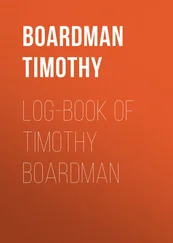“Many young scientists need practice to improve their writing. Figure 1 shows that students who wrote regularly performed better.”
Discussion in class with my students on writing active or passive sentences invariably leads to the question whether it is acceptable to use “I” or “We” in scientific writing. Clearly, if I encourage the use of the active voice, I must also accept the use of first person pronouns. What about the scientific community as a whole? Ken Hyland and Kevin Jiang (2017) have provided data to answer this question. The authors noted an increase in the use of “I” and “We” in recent years in the natural sciences but less so in the social sciences. Thus, such sentences at least in the natural sciences are becoming more commonplace. My advice to my students at the end of the class discussions is pragmatic. If the writer feels that the clarity of the sentence benefits from “I” or “we”, then their use is justified.
Box 2.3has a further six sentences with many needless words. section 2.5.3presents the improved versions.
Box 2.3Omit needless words!
Rewrite the sentences to make them simpler. See how many words you can remove. My suggestions can be found in section 2.5.3.
1. It can be seen from Figure 1 that there is a significant correlation between the rate of growth of the incidence of cardiac-related disease and illness and the increasing frequency of the possession and use of a television.
2. It is a fact that 20% of the world's population has no clean water or enough to eat.
3. The effect of compound X on blood pressure has not yet been investigated in any detail.
4. Another important reason for this optimisation is the fact that we should try to get rid of pollution.
5. Synergy will lead to a significant reduction in the amount of funding required.
6. There is a considerable, if not extensive, body of literature dedicated to demonstrating that the Earth can be considered as a spherical body traversing a circular path around a similarly shaped, although significantly larger and completely different in nature, body which is in common parlance termed the Sun.
2.1.8Read and think about your work
If you have not read your work, why should anyone else? Do this on a printout as errors, inconsistencies and discrepancies are often very difficult to detect on the computer screen. In addition , the printout lets you compare different pages. This is very time-consuming on the monitor. For instance, if there are two abbreviations for the same chemical in various parts of the manuscript, it will be very difficult to find this inconsistency on the monitor.
Reading your work is only the first step toward improving it. You must also start to think critically about it. Put your writing into question. Does the text fit together? Read it out aloud to find out. Are the sentences too complex? Read them aloud to find out. Is the text written in formal English? Look at chapter 1 Chapter 1An introduction to scientific English It is well-known that, in grammatical terms, languages are more perfect the older they are and that they always become gradually worse, from high Sanskrit down to English jargon, this patchwork cloak of thoughts stitched together from rags of heterogeneous material. (Bekanntlich sind die Sprachen, namentlich in grammatischer Hinsicht, desto vollkommener, je älter sie sind, und werden stufenweise immer schlechter – vom hohen Sanskrit an bis zum englischen Jargon herab, diesem aus Lappen heterogener Stoffe zusammengeflickten Gedankenkleide.) ARTHUR SCHOPENHAUER The chapter begins by looking at the advantages and disadvantages of English as the language of scientific communication, presents some guidelines on how to write the formal English found in scientific writing and ends by suggesting a basic vocabulary for written scientific communication.
to check. Did you keep the guidelines from chapter 2in mind whilst writing? Search again for complicated sentences and needless words. Simplify the sentences and omit the needless words. Did you think about the reader whilst writing? Do all the sentences express your thoughts so that the reader will understand them? These questions are the first steps on the way to writing a coherent text in scientific English. Box 3.2 has further suggestions to help you identify problems in written work.
2.2Just to make you feel better
Do as I say, not as I do!
CHILD-REARERS' ADAGE
The first two chapters contained a plethora of guidelines and suggestions for scientific English. You are perhaps wondering how long it will take to grasp their use and whether you will be able to apply them to every text you write. My advice is not to worry for now. Just try as much as you can to use them in your writing. The more you practise, the more they will come automatically.
To make you feel better, here are two examples in which native English speakers have difficulties with the use of scientific English. In the first, the editor of Nature mislays his own principles. In the second, the level of English in manuscripts written or proofread by native speakers is criticised by peer reviewers.
2.2.1An example from a former editor of Nature
Remember too that even experienced writers are not perfect and can sometimes forget their own principles. Even a writer as experienced as an editor of “Nature” can mislay his principle of writing for an international readership. The text entitled “A word in your ear” (Campbell, 1998) provides an ironic example. The editor's text was aimed at encouraging established scientists to take more care in their conference presentations. The editor stressed the importance of the “clear transmission of ideas”, an admirable initiative. Sadly, though, the editor did not pay attention to his own suggestions. The vocabulary contains some uncommon words (see box 2.4) and most of the sentences are too long. For instance, look at all those complex negative sentences at the end of paragraph 3 and the beginning of paragraph 4. The one at the end of paragraph 3, in a modified form, is used as an illustration in section 2.1.5. Are there other sentences which you found difficult to comprehend? How would you improve their clarity?
In short, everyone can have an off-day. The goal is to make such off-days as rare as possible. Constant practice in applying the guidelines and suggestions from chapters 1and 2 Chapter 2Writing clear scientific English Put it before them briefly so that they will read it. Clearly so they will appreciate it. Picturesquely so they will remember it. And, above all, accurately so they will be guided by its light. JOSEPH PULITZER This chapter contains eight guidelines specifically designed to transform school or college English into scientific English. Although the guidelines were selected with non-native speakers in mind, they are also helpful to native speakers. Remember that English as a first language is not a passport to writing clear scientific English. Indeed, non-native speakers who master this chapter may be on the way to writing better scientific English than native speakers. Any book on how to write good English is certain to contain seven of the guidelines. The one exception, the guideline “Omit needless words!”, is unique to the book “The Elements of Style” by W. Strunk, Jr. and E. B. White. This book, first published in 1918 and still in print, remains the best book available on writing good English. Its 105 pages can now be accessed for free at www.bartleby.com/141 .
is the best way of achieving this goal.
2.2.2Reviewers are humans too
In addition to examining the level of the science in a manuscript submitted for publication, reviewers are also asked to comment on the authors' level of English. Over the years, I have noticed that some reviewers appear to use the authors' affiliations as a criterion to judge the English. Indeed, almost all the native English-speaking scientists that I know in Vienna have had at least one manuscript returned with the comment that the English should be revised by a native speaker. Presumably, the reviewers did not expect well-written English manuscripts from Viennese scientists. These native English speakers included a fellow of the Royal Society, a former chair of the EMBO Science & Society Committee and me. Thus, if a reviewer suggests English revision you are in good company! In each of the three cases above, we all simply wrote back that the English had been checked by a native speaker (which was true) without making any language changes. This course of action has also been recommended by Janet Carter-Sigglow (1997), working in the translation centre of a research institution in Germany.
Читать дальше
